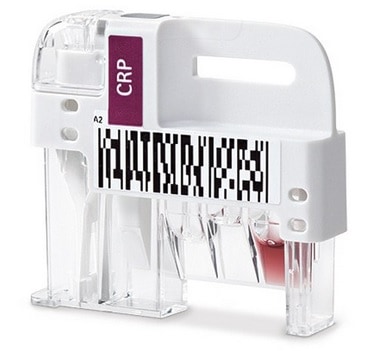
Quick test minimises unnecessary antibiotic prescribing
pharmafile | October 1, 2015 | News story | Medical Communications | antibiotic resistance
New data presented at this week’s Royal College of General Practitioners (RCGP) Annual Conference reveals that in real-world general practice, C-reactive protein point of care testing (CRP POCT) successfully helped to identify patients who did not require antibiotics, when presenting with symptoms of respiratory tract infections (RTIs).
The study included 99 patients, aged 5-75 years, who visited their GP with a chesty cough. After undergoing a clinical scoring system, each patient’s CRP levels were measured at the point of care using Alere’s Afinion CRP test.
Only 13% of these patients needed antibiotic treatment as the CRP POCT had concluded higher CRP levels. Within one month, 17% of the 99 patients returned to the surgery and only 5% were prescribed antibiotics.
Almost 80% of antibiotics are prescribed in primary care and RTIs are the reason for 60% of these antibiotic prescriptions, despite robust evidence highlighting little or no benefit from antibiotic treatment in respiratory tract infection (RTI) symptoms.
A large majority of these infections are self-limiting or caused by viruses, in which case antibiotics have little or no clinical benefit for patients.
Previous studies have shown that CRP POCT can reduce antibiotic prescribing for RTIs in primary care by up to 41.5% and could potentially save the NHS £56 million a year in prescription and dispensing costs alone.
Dr Rob Cook, a GP from London who was involved in the study, says: “This study was conducted to see how feasible and useful CRP POCT is in real world general practice. We found that the test could be easily incorporated into routine care and provided very useful information for GPs and patients presenting with a cough. The vast majority of patients were reassured by a low CRP level and did not receive antibiotics.
“NICE has recommended point of care testing in primary care for lower respiratory tract infections and advises it is considered after clinical assessment as it can reduce use of antibiotics. But it is acknowledged that real life experience in the UK is limited and so was uncertain what the impact might be for work flow in the GP setting.
“Reducing antimicrobial resistance is becoming a national priority for all healthcare systems. By using CRP POCT GPs can play their part in this and further promote rational prescribing of antibiotics.”
The study also provides insights on patients’ expectations of receiving antibiotics. All participants completed a questionnaire in which they were asked whether they expected to receive antibiotics for their symptoms. Of the 26 patients expecting to receive antibiotics, only seven patients (27%) received them. Additionally, patients with lower CRP levels (who therefore would not have been suitable for antibiotics), were shown to be more likely to expect an antibiotic when asked.
The CRP POCT test takes less than five minutes from a finger stick blood sample to provide a quantitative result and can help facilitate an effective conversation between patients and GPs around the rational use of antibiotics.
It is already used in routine management in several European countries to aid diagnosis in suspected RTI and guide decision-making regarding antibiotic prescribing. Despite this, the UK continues to lag behind, with CRP POCT still less widely used in the UK than in other European countries, many of which have lower rates of antibiotic usage.
Joel Levy
Related Content

Scientists use AI to find new antibiotic to fight superbug
Scientists at McMaster University and the Massachusetts Institute of Technology (MIT) have utilised artificial intelligence …

London’s water contains high levels of antibiotic-resistant genes, UCL research reveals
Research from University College London has warned that freshwater sources in the English capital of …

The global rise in antibiotic resistance threatens infection prevention and cure
Dr Bill Love, Founder and Chief Scientific Officer of Destiny Pharma, discusses the rise of …








